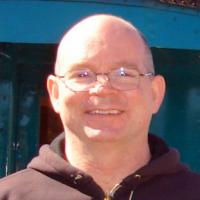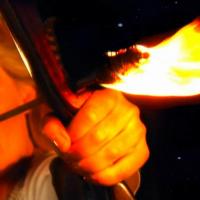
Esperantists do need nerves of steel, and also a heart of flesh...
ca, kivuye
Ubutumwa 100
ururimi: English
biguglydave (Kwerekana umwidondoro) 23 Mukakaro 2010 22:49:28
darkweasel:My attempt at some humor was inappropriately clear. I apologize for the attribution of guilt to Lernu, for in fact, they have been a guiding light!biguglydave:16 easy language rules, oh wait, several hundred pages of PMEG too?I'm wondering where exactly lernu! says so?
Pri la FundamentoThat chapter contains the famous 16 rules. It is a common misconception that Esperanto has only 16 rules. In fact, the number of rules is far greater; indeed the "Fundamenta Gramatiko" itself contains 17 rules, as it begins with an unnumbered explanation of the alphabet. Further, more rules can be found in the Ekzercaro section, both as direct instructions and by means of examples. Some parts of the Fundamenta Gramatiko can only be properly understood if one compares them with the practical usage in the Ekzercaro.
erinja (Kwerekana umwidondoro) 24 Mukakaro 2010 01:06:08
"International" evenings often have some kind of mini cultural fair; tables are set up and people can offer bits of food or objects that illustrate their cultures, so you can learn a bit about the countries of the people attending.
If an event is international there will often be a 'national' evening to showcase the culture of the country where the event is held.
One evening will often have some kind of banquet or nice communal meal, if meals are not provided as part of the conference.
At youth events, there is usually at least one evening with dancing (think, dancing like in a club/disco) or a communal visit to a nightclub/disco. At large events there is usually a concert on one night by an Esperanto artist. At small events this is rare.
Youth events often have a 'gufujo' ("owl place"), particularly on the night when you have dancing. It's a bit like a chill-out room. Dim lighting, snacks, non-alcoholic hot drinks like tea. People sit and chat quietly.
Board games and card games can be popular late-night activities, depending on the event. If the event is held in a city, groups will sometimes go out together after the end of official events in the evening. Young people often stay up incredibly late at Esperanto events. You're having so much fun, it's hard to tear yourself away to go to bed.
Most Esperanto events of any size (say, 30 people or more) will offer a book service, which could range from a table with a few books and CDs available for purchase, to a whole room full of books. Most Esperanto events of that size or above will also offer some Esperanto classes for beginners.
This year at the US convention we had a used book and magazine exchange, and it was a wild success. We asked people to bring any old Esperanto books and magazines that they no longer wanted, so they could be given away or sold at affordable prices. It was a great way for people to clean out things from their collections that they weren't using and to recirculate the materials. It was also good for students and the unemployed (and underemployed) to get affordable Esperanto books, since they can be quite expensive.
On a practical note, the Esperanto community recognizes that not everyone has a lot of money. Registration fees are usually scaled so that if you come from a poor country you pay much less, and also if you're a youth (usually younger than 30), a retiree, or unemployed, you pay less. There is usually more than one option for housing, so you can often get cheaper no-frills housing, or something more deluxe. In many cases, there is an option to bring a tent and camp rather than staying in a room (this is popular in Europe in particular). At week-long events with meals served, the meals are almost always optional. If you are arranging your own housing and meals, outside the auspices of the conference, you are referred to as a 'memzorganto' (taking care of yourself-person). Youth events will often have an 'amasloĝejo' (mass lodging) option - it usually refers to bringing a sleeping bag and sleeping on the floor of a gym or other large room, and it's usually very cheap.
biguglydave (Kwerekana umwidondoro) 24 Mukakaro 2010 06:37:20
erinja:Esperanto congresses normally have ...Wow! Thanks for the wonderfully detailed activity report. It's very helpful and motivating, with the exception of the singing part. Although Elvis Presley and I had a common ancestor nine generations in the past, the singing genes didn't come down my side of the family tree. However, the Esperantic financial considerations for we poorer, non-singing Presley's is reassuring.
By the way, my spouse is proactively non-Esperantist. I thought I remember hearing something about “Esperanto widow/widowers” activities and excursions at the last USA congress. Do you or anyone else have any first hand knowlegde of such things? The SFSU location for the USA gathering in 2011 seems to offer a lot of variety.
Thanks in advance.
gyrus (Kwerekana umwidondoro) 24 Mukakaro 2010 10:57:11
erinja (Kwerekana umwidondoro) 24 Mukakaro 2010 15:13:53
biguglydave:By the way, my spouse is proactively non-Esperantist. I thought I remember hearing something about “Esperanto widow/widowers” activities and excursions at the last USA congress. Do you or anyone else have any first hand knowlegde of such things? The SFSU location for the USA gathering in 2011 seems to offer a lot of variety.My friend came up with the widow/widowers idea for our national conference this summer. As far as I'm aware it's the first time that someone has done something like that. We had a spouses' excursion to the zoo (that wasn't pre-planned, that's what all of the spouses agreed upon). We found that many of the spouses weren't looking for a lot in the way of a program; a lot of them had already made their own plans. I think it's less of a problem in a large urban area where there's a lot of tourism and shopping to be done. It can be more of a problem at smaller events, and particularly events that are in rural areas. I have seen certain spouses coming year after year to certain events, and they always seem bored to me. It puts an additional strain on the Esperanto half of the spouse, because of course you are there to "do Esperanto", but you also don't want your spouse to be bored.
Regarding the singing, it's always people who volunteer to sing, no one will make you sing! Though it is traditional to close out the conference with a group singing of the Esperanto 'anthem', "La Espero".
I forgot to add in my previous post that large US events (this would be pretty much only the national congress) usually run over a weekend, and Sunday mornings usually feature some kind of religious activities for religious people. Normally someone religious will lead a Christian Bible study, or groups go to local churches for services - usually there's a Catholic group and a Protestant group (not enough people to split up beyond that, though of course you can go on your own). I haven't seen as much of this in Europe, where people tend to be less religious than Americans. But a large event running over a holiday like Easter will often have some kind of religious service offered.
josephschwenker (Kwerekana umwidondoro) 24 Mukakaro 2010 22:29:50
 But I say just shrug it off and make a joke out of it, play along with a sort of comedic character about it. When you start getting other people laughing, you start to break down the level of fear and animosity (whatever that word means). Let's face it, you're at school, you're kids, you don't know each other exceedingly well, if all they've heard of you is that you're apparently a communist, of course they're gonna regard you as one because it's all they know to think of you
But I say just shrug it off and make a joke out of it, play along with a sort of comedic character about it. When you start getting other people laughing, you start to break down the level of fear and animosity (whatever that word means). Let's face it, you're at school, you're kids, you don't know each other exceedingly well, if all they've heard of you is that you're apparently a communist, of course they're gonna regard you as one because it's all they know to think of you 
It's good that you aren't so paranoid about communism in Australia. In America, everyone hates it. Isn't it a bit contradictory, though, that you like to "knock down the big guy", and yet, there is a proposed internet censorship bill in Australia?
The kids at school know me fairly well, so they don't just remember me for my viewpoints. I don't have that much of a problem with them calling me a communist and teasing me about it, but it is an annoyance at times. I have to stop what I'm doing and give everyone the speech about what Marxist Communism is, what North Korea is, then what my viewpoints are. Of course, no one listens except the teacher, so it's just a vicious circle.
Regarding Luna, Luna is what I call my independent political viewpoints. Read the manifesto and the laws to get a better understanding.
PaulExcoff (Kwerekana umwidondoro) 25 Mukakaro 2010 02:08:01
biguglydave:The SFSU location for the USA gathering in 2011 seems to offer a lot of variety.The 2011 congress is at SFSU? When? (please say after June 6th...)
Lunombrulino (Kwerekana umwidondoro) 25 Mukakaro 2010 06:01:09
PaulExcoff:Sorry - Memorial Day.biguglydave:The SFSU location for the USA gathering in 2011 seems to offer a lot of variety.The 2011 congress is at SFSU? When? (please say after June 6th...)
Lunombrulino (Kwerekana umwidondoro) 25 Mukakaro 2010 06:03:13
biguglydave:By the way, my spouse is proactively non-Esperantist. I thought I remember hearing something about “Esperanto widow/widowers” activities and excursions at the last USA congress. Do you or anyone else have any first hand knowlegde of such things? The SFSU location for the USA gathering in 2011 seems to offer a lot of variety.Dave - There wasn't any activity planned for widow/widowers until now, but it's a great idea! I'm the one in charge of planning excursions and such for the event. I will propose this to the group and see if it flies.
Thanks in advance.
PaulExcoff (Kwerekana umwidondoro) 25 Mukakaro 2010 09:20:11
Lunombrulino:DAMNE! I live right by San Francisco, but starting next month I'm going to college in Maine, and my summer vacation doesn't start until June 6th... just my luck.PaulExcoff:Sorry - Memorial Day.biguglydave:The SFSU location for the USA gathering in 2011 seems to offer a lot of variety.The 2011 congress is at SFSU? When? (please say after June 6th...)



